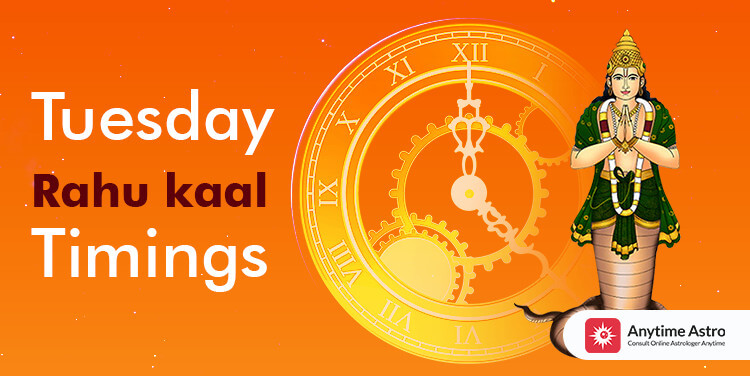Our wise ancestors had a clever habit. They would always double-check the Rahukaalam and Yemagandam timings before performing or participating in any crucial activity or event. They avoided commencing any significant activities during the said period, as they are considered inauspicious.
For instance, on a Tuesday, when anyone plans to go out for a work trip, they should ensure checking Tuesday's Rahukaalam and Yamagandam timings and avoid these inauspicious hours to guarantee a good start.
One can utilize the given table to check the timings of Rahu Kaal, Yamagandam, and Gulika Kaal.
|
Day |
Rahu Kalam |
Yama Gandam |
Gulika |
|
07:30-09:00 |
10:30-12:00 |
13:30-15:00 |
|
|
Tuesday |
15:00-16:30 |
09:00-10:30 |
12:00-13:30 |
|
12:00-13:30 |
07:30-09:00 |
10:30-12:00 |
|
|
13:30-15:00 |
06:00-07:30 |
09:00-10:30 |
|
|
10:30-12:00 |
15:00-16:30 |
07:30-09:00 |
|
|
09:00-10:30 |
13:30-15:00 |
06:00-07:30 |
|
|
16:30-18:00 |
12:00-13:30 |
15:00-16:30 |
Also See: Today Shubha Hora
Please be aware that the above information may change depending on the time of Sunrise and Sunset on that particular day. While most of you are probably aware of these times of day, many of you would also be interested in learning more about them. Let's examine each of these to gain a better understanding.
Rahukalam
The seven planets Sun, Moon, Mars, Mercury, Jupiter, Venus, and Saturn each have a particular day of the week assigned to them in Vedic astrology. However, the shadow planets (Rahu and Ketu) don't have such an allocation. However, they have been given the authority to rule for 1.5 hours each day of the week, which is referred to as Rahu Kalam and Yamagandam.
Considering Tuesday, Rahu's energy is at its peak during the Tuesday Rahukalam. Unless Rahu receives a favorable position in one's horoscope, it might produce difficulties and disappointment. The sunrise and sunset periods in a given place also have an impact on Rahu Kalam.
Rahu Kalam occurs every day for around one and a half hours. As a result, it is best to avoid Rahu Kalam and avoid beginning new enterprises or conducting auspicious events during this period. Tuesday rahukalam timings - 15:00-16:30.
Also See: Today Gowri Panchangam Muhurat
Yamagandam - The Time of Yama
Yamagandam refers to the time of Yama, also known as the son of Planet Sun (Yam or Yamraj - the Lord in charge of transferring an individual's Soul (Atma) to its rightful place after death). Anything that begins during this time period is unlikely to succeed. During this time, only death ceremonies and rituals are performed. It is critical not to begin any event or task involving money or travel at this time. Yamagandam is determined by dividing the day hours into eight parts, dividing each for around one and a half hours. The Tuesday Yamagandam time is 09:00-10:30 am.
Gulika Kaal - The Hour of the Gulikan
Gulika Kalam takes place for around one and a half hours per day. Gukila Kalam represents the hour of Gulikan, Saturn's (Shani's) son. This is Saturn's time, and it should be avoided because it is typically considered unlucky. Every action performed in the Gulika Kalam gets repeated. As a result, it is critical to avoid rituals such as death-related rites. The Tuesday Gulika kaal timing - 12:00-13:30.
Tuesday Rahukalam, Yamagandam & Gulika Kaal
Tuesday is Mangal (Planet Mars) day. This day is dedicated to the Goddess Durga, Goddess Kali, Lord Hanuman, and Lord Ganesha. Tuesday is also related to the planet Mars, also known as Mangal, which is a strong and aggressive planet that is said to be naturally malefic.
It is best to avoid Tuesday rahukalam because it is already Mangal(Mars) Graha day. Additionally, Individuals should equally avoid Tuesday Yamagandam time. Before holding any auspicious event or starting a new business on this day, it is best to review the Rahu Kalam timing for the day, as it may be beneficial or harmful to the result.
The Tuesday rahukalam and yamagandam timings are viewed as unlucky. If you want to be successful, you should avoid beginning something new during this time. On a daily basis, individuals should read the Panchang or the Choghadia (hours of the day split into auspicious parts - Shubh, Labh, Char, Amrit - and unfavorable parts - Kaal, Rog, and Udveg).
Also See: Today Shubh Muhurat Time
Remedies for Gulika Kaal, Rahu Kalam, and Yamagandam on Tuesday
Skipping the Rahu Kalam, Yamagandam, and Gulika Kalam for the day is a perfect way to carry out any auspicious work or start something new. However, one can perform their daily routines without adhering to these timings.
There are situations when performing important work is unavoidable, even on Tuesday Rahukalam, Yamagandam, and Gulika kalam. In such cases, one can set aside some money or pray to the Kul Devta before beginning a task or going on a journey.
Individuals who do not know their Kul Devta can narrate Ganesha Mantras and the Hanuman Chalisa. Both God Hanuman and God Ganesha have specific powers (Siddhis) that help individuals to overcome the negative effects of Rahu, Yama, or Gulika. Chanting the Mantras provides one the confidence to tackle challenges head-on. One can conquer any hurdle by worshipping Lord Ganesha and Lord Hanuman. Devotees can offer Lord Hanuman panchamrutham and jaggery. Additionally, before starting the work one should consume the prasad.
Another remedy is to keep a Vrat (Fast). Vrat is an important component of Indian culture and is related to many Hindu rites and customs. Observing a Vrat means not touching food or even water for the duration of the tradition performed during a Pooja or festival. Individuals perform a Vrat to worship or please the Gods or Goddesses. Moreover, It indicates an individual’s determination as well as their devotion.
Additionally, keeping a Vrat on Tuesday may neutralize the adverse effects of Rahu Kalam, Yamagandam, and Gulika Kalam.





Leave a Comment